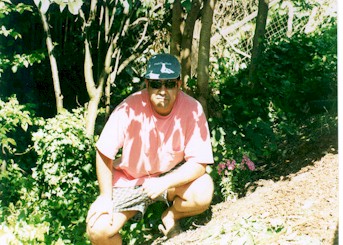Sevara Nazarxon
“On the evening of the first day of Ramadan in Tashkent, capital of the secular Islamic republic of Uzbekistan, the crowd inside Mama's Fun Pub was cutting loose. A beefy deejay, black baseball cap akimbo, pranced about the nightclub's sound stage. Slithery, sweaty female torsos provocatively clad in hotpants, skintight skirts, and black leather halters undulated on the dance floor, rolling their exposed navels to the pulsating rhythms of electronically enhanced pop music. Young men, their eyes popping out, tried to keep pace. Nearby, bartenders doled out Heineken on tap. Cigarette smoke clouded the room. Laser lights cut through the fog, creating an otherworldly scene, heaven or hell, depending on the depth or direction of your religious predilection.” (Robert Rand, “Tamerlane's Children”.)
This is the world of Sevara Nazarxon.
Sevara was born in 1978 in Andijon, to a father who was at the State Radio Committee, and a mother who taught traditional Uzbek musical instruments. She started her career in music as a dotar player in the National TV and Radio Committee of the newly independent Uzbekistan; upon graduation from school, she went on to the Uzbek National Conservatory. Folk traditions are the foundation of her music. In 2000 she started her solo Uz-Pop career, and now is one of the many 'world music' performers on the Peter Gabriel circuit. (It is a pity that the economics of production, dictates of mixing, and the uncomplicated tastes of the consumers all conspire to make every last one of the 'world fusion' performers from Paban Das Baul to Anusheh Anadil to Sevara sound about the same, but that's for another day.)
You cannot be a nightclub blues chanteuse in conservative Andijon, where I would struggle to see a single woman with uncovered head in public (the local boys have to head to the 'Russian' town of Farg'ona to have a drink.) So Sevara lives in Tashkent. With a Real World Records contract, she lives the dream life of her co-clubistas (a typical monthly salary in Uzbekistan is USD 50, somewhat more in Tashkent.) She describes herself as Muslim; but her belief is supple like the nightclub belly dancers she works with. During the weekends in Ramazan, she goes to the Zangi Ota mosque outside Tashkent to sit in silence and pray briefly. Nearby, Uzbek elders sacrifice chickens to Zangi Ota and beggar women wait in huddles for alms. When evening falls, Sevara and her generation head back to Mama's Fun Pub.
Sevara's lyrics come out of traditional Uzbek poetry on 'muhabbat' (love, typically lost):
Umir oqmas bir tekis titdek
Kimlarnidir hasrat yengadir
Men toparman irodani lek
Korgim kelar sizni negadir
Grief can overtake someone
I will find strength to overcome
But I still want to see you
For some reason.
(Robert Rand lived in Uzbekistan between 2001 and 2004. He was a part-time producer of National Public Radio, and wrote several portraits collected into Tamerlane's Children - Dispatches from Contemporary Uzbekistan. You can hear his piece on Sevara Nazarxon at the NPR archives.)
This is the world of Sevara Nazarxon.
Sevara was born in 1978 in Andijon, to a father who was at the State Radio Committee, and a mother who taught traditional Uzbek musical instruments. She started her career in music as a dotar player in the National TV and Radio Committee of the newly independent Uzbekistan; upon graduation from school, she went on to the Uzbek National Conservatory. Folk traditions are the foundation of her music. In 2000 she started her solo Uz-Pop career, and now is one of the many 'world music' performers on the Peter Gabriel circuit. (It is a pity that the economics of production, dictates of mixing, and the uncomplicated tastes of the consumers all conspire to make every last one of the 'world fusion' performers from Paban Das Baul to Anusheh Anadil to Sevara sound about the same, but that's for another day.)
You cannot be a nightclub blues chanteuse in conservative Andijon, where I would struggle to see a single woman with uncovered head in public (the local boys have to head to the 'Russian' town of Farg'ona to have a drink.) So Sevara lives in Tashkent. With a Real World Records contract, she lives the dream life of her co-clubistas (a typical monthly salary in Uzbekistan is USD 50, somewhat more in Tashkent.) She describes herself as Muslim; but her belief is supple like the nightclub belly dancers she works with. During the weekends in Ramazan, she goes to the Zangi Ota mosque outside Tashkent to sit in silence and pray briefly. Nearby, Uzbek elders sacrifice chickens to Zangi Ota and beggar women wait in huddles for alms. When evening falls, Sevara and her generation head back to Mama's Fun Pub.
Sevara's lyrics come out of traditional Uzbek poetry on 'muhabbat' (love, typically lost):
Umir oqmas bir tekis titdek
Kimlarnidir hasrat yengadir
Men toparman irodani lek
Korgim kelar sizni negadir
Grief can overtake someone
I will find strength to overcome
But I still want to see you
For some reason.
(Robert Rand lived in Uzbekistan between 2001 and 2004. He was a part-time producer of National Public Radio, and wrote several portraits collected into Tamerlane's Children - Dispatches from Contemporary Uzbekistan. You can hear his piece on Sevara Nazarxon at the NPR archives.)


0 Comments:
Post a Comment
<< Home